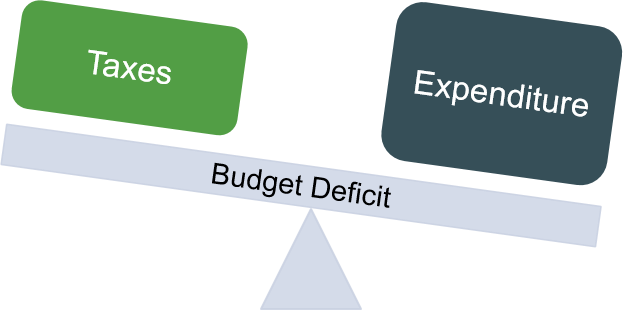
ISLAMABAD: Pakistan recorded a record budget deficit of Rs2.26 trillion (6.6 percent of GDP) in the last financial year 2017-18 due to a lagged performance of the tax machinery and expansionary fiscal policies.
The Ministry of Finance in its annual consolidated and provincial budgetary operations report said budget deficit widened to Rs2.26 trillion in FY18, equaling 6.6 percent of GDP, reports Express Tribune.
FY18’s budget deficit broke FY17’s record of Rs1.864 trillion. The budget deficit for FY18 was Rs780 billion (2.5 percent of GDP) higher than the target approved by the last parliament in June 2017.
And the budget deficit of 6.6 percent of GDP breached the limit approved limit of 4.1 percent set by the previous parliament.
The record budget deficit for FY18 has been blamed on hasty expenditures by the provinces and federation as general elections loomed and a precipitous fall in tax and non-tax revenues.
The budget deficit of 6.6 percent of GDP was the highest recorded during the five-year tenure of the previous PML-N government.
Also, this doesn’t include around Rs2 trillion of liabilities not recorded in the budget books.
These liabilities not recorded in the budget books are linked to the outstanding debt of gas, commodity and power sectors.
Overall circular debt including the one parked in Private Holding Power Limited (PHPL) has risen to Rs1.1 trillion.
To finance this gap, Pakistan obtained Rs785 billion in shape of foreign loans and Rs1.5 trillion in domestic loans in FY18 and gross foreign loans were recorded at Rs1.235 trillion.
During FY18., the actual external debt repayments touched Rs450.2 billion against a budget projection of Rs326 billion, revealed an official summary.
Pakistan’s gross public debt ballooned to Rs28 trillion or 72.5 percent of GDP. As the debt burden rises, the country spent Rs1.5 trillion or one-third of its overall budget on debt servicing in FY18.
Leaving aside the Khyber-Pakhtunkhwa government, Punjab, Sindh and Balochistan governments cumulatively book a budget deficit of Rs22.4 billion, spending lavishly ahead of general elections instead of generating a cash surplus of Rs347 billion.
Sindh’s budget deficit for FY18 stood at Rs42.3 billion, Balochistan overspent Rs7.8 billion. In Punjab, the overall expenditure swelled to Rs1.42 trillion against revenues of Rs1.4 trillion, a deficit of Rs6.6 billion.
However, the KP government booked a cash surplus of Rs34.4 billion.
After the transfer of provincial shares, the federal government overall net income was recorded at Rs2.5 trillion, however, it sustained expenditure of Rs4.7 trillion, resulting in a deficit of Rs2.2 trillion.
Tax revenues of the federal government declined by around Rs265 billion against a projection of Rs4.3 trillion.
This was attributable to the inability of the Federal Board of Revenue (FBR) to attain its annual tax collection target of Rs4.013 trillion.
The tax regulators collection was recorded at Rs3.842 trillion, which includes the Rs121 paid under the tax amnesty scheme.
Also, tax collection under other heads declined to touch Rs223.6 billion, resulting in a shortfall of Rs94 billion largely due to a decrease in recovery of Gas Infrastructure Development Cess (GIDC).
Non-tax revenues recorded a shortfall of Rs350 billion, touching Rs630 billion.
This was attributable to the United States decision to curb Coalition Support Fund (CSF) payments, lesser than the budget profit of the central bank and shortfall in dividends and mark-up receipts.
Defence receipts were recorded at Rs12.7 billion against budget estimates of Rs142 billion. Public-Sector Development Programme (PSDP) actual spending was recorded at Rs660 billion against a budget of Rs1 trillion including development grants to the provinces.
The actual current spending in FY18 increased to Rs3.8 trillion against budget current expenditures of Rs3.4 trillion because of a rise in budgeted defence and debt service spending.























